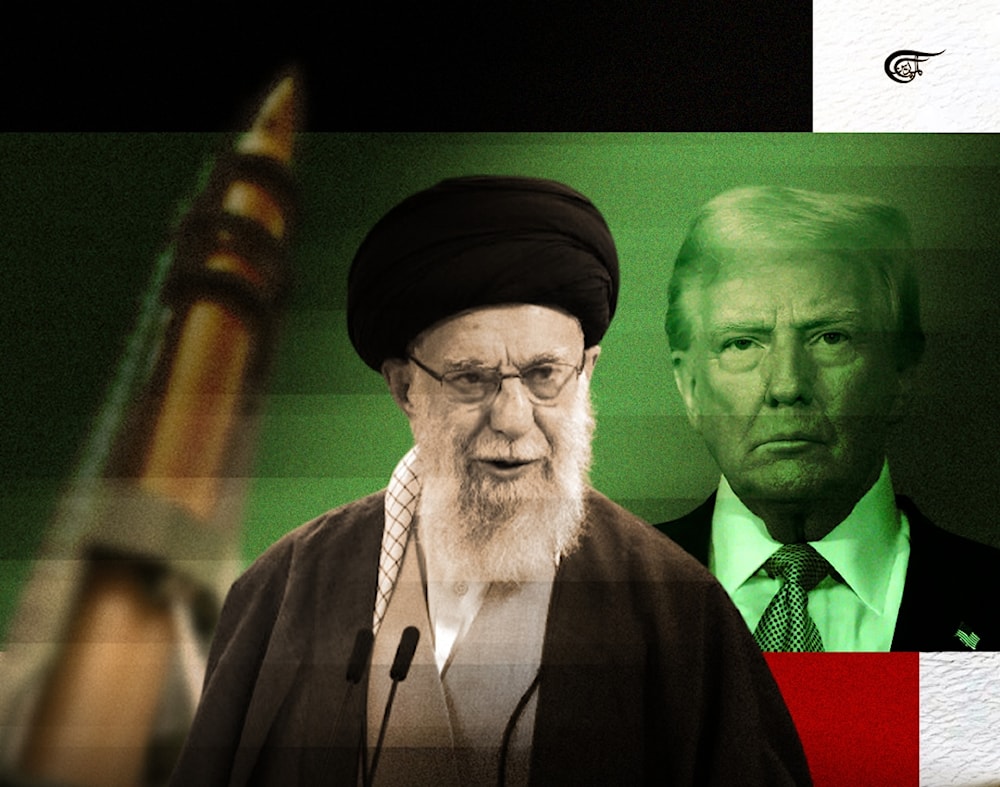Taking provocations head-on
Away from double standards on the sovereign defenses of Iran and the rest of the world, what if Washington was the subject of such an outrageous bombing threat?
-

Warnings passed on by Iranian leaders should temper the enthusiasm of all those who hope to take Iran’s sovereignty for granted (Illustrated by Batoul Chamas; Al Mayadeen English)
In recent weeks, a series of Iranian leaders issued pointed threats toward "Israel" and the US, warning the occupation not to underestimate Tehran’s response capabilities. Ali Larijani, senior advisor to Iran’s Supreme Leader, has warned that any attack under the garb of nuclear weapons would prompt Tehran to muster its defenses. IRGC Navy Commander Alireza Tangsiri has redoubled Iranian support for Resistance groups, sending a powerful message to an occupation that spares no effort in distorting Tehran’s actual position on regional peace. Iran’s Leader Sayyed Ali Khamenei and his advisor have also reiterated defiance to external hostility. Here is why all this matters.
First, foreign warships in the Gulf necessitate Tehran’s alarm. The US is in the process of exercising so-called “deterrence” with Iran as it bolsters additional deployments and seeks to threaten Tehran with F-35 combat jets, bombers, and destructive drones. It is not the call of a foreign, interventionist power like the United States to wield its muscle in the sovereign waters of Iran and its neighbors.
This is the situation amid claims that the deployments aren’t a lead-up to an attack, but can a hostility-driven, warmongering Trump administration ever be trusted?
Ground realities suggest the US is using cruise missile-carrying destroyers and other warships in the region to stir up possible aggression. For Tehran, a vocal supporter of regional stability, the threat to “stand up against any threats to protect its rights and interests” is thus a necessary deterrent and sovereign imperative. "If foreigners attempt to attack us, pressure us, or endanger our interests, we will stand against them with full force," affirmed Alireza Tangsiri, the commander of the Iran Revolutionary Guard Corps (IRGC) Navy.
Second, Trump’s threat to attack Iran under the garb of the ‘nuclear program’ could prove to be a recipe for self-capitulation. First, it would strengthen Tehran’s legitimate justification to pursue accelerated development of the program, given the public’s interests in placing the country’s territorial integrity and sovereign defenses above all else. Second, the gravity of Washington’s threat – and its tendency to operate in tandem with the occupation – could corroborate Iran’s position that remaining on high-alert is a major prerogative beyond any compromise.
Let’s not create double standards on the sovereign defenses of Iran and the rest of the world: if Washington was the subject of such an outrageous bombing threat, it would’ve invoked the UN Charter and focused energies around deterrence and proportional response. Besides, the US would be ill-advised to forego an opportunity to engage on an equal footing with Tehran, given the space for overlapping economic interests that could bridge divisions and prove mutually beneficial. The Trump administration’s military threats could prove to be an own goal as they could prevent a convergence of economic interests, as mentioned by Ali Larijani, senior advisor to the Iranian Leader Sayyed Khamenei.
Beyond economics, it is worth an ask: how would the remotest attempt at attacking Iran benefit US interests? Washington is squarely to blame for violating the hard-won nuclear pact of the Joint Comprehensive Plan of Action (JCPOA), and for an administration that claims its hand at a nuclear compromise, raising temperatures through attack threats would only work to its detriment.
Given the occupation’s colonial and expansionist aggression, Tehran’s warnings remain ever more critical. For instance, the defining feature of the Iranian Leader’s opposition to hostility is self-defense, an important imperative to challenge any iota of “mischief” by the occupation and the United States. The past track record of blatant interference corroborates Iran’s position. After all, the West was central to unrest during the 2022-2023 domestic protests in the country, and the occupation’s condemnable aerial aggression against Iran late last year made the source of blatant provocations as clear as day. For an occupation that thrives on committing genocidal crimes and violation of sovereignties and feels its aggression plots are beyond account, Sayyed Khamenei’s warning shows that any offensive action will necessitate a proportional and necessary response.
Tehran is not short of any operational course of action.
For instance, it is well equipped to launch Operation True Promise 3, and it put its capabilities into action through the previous two iterations, featuring retaliatory missile and drone operations against the Israeli occupation. The Zionist regime faces an even more formidable challenge this time, given Tehran’s success in mustering all defensive prerequisites to a military capability that is more than tenfold in strength to Operation True Promise 2. The high-precision attack capabilities could strike at the core of an occupation that has been weakened at its seams. So, before any entity looks to exercise reckless aggression against Iran, let it be known that retaliation – legitimate by definition – would come with twice the force.
Ultimately, the series of warnings passed on by Iranian leaders should temper the enthusiasm of all those who hope to take Iran’s sovereignty for granted. That is an impossibility and remains written in stone.

 Hannan Hussain
Hannan Hussain
 5 Min Read
5 Min Read











